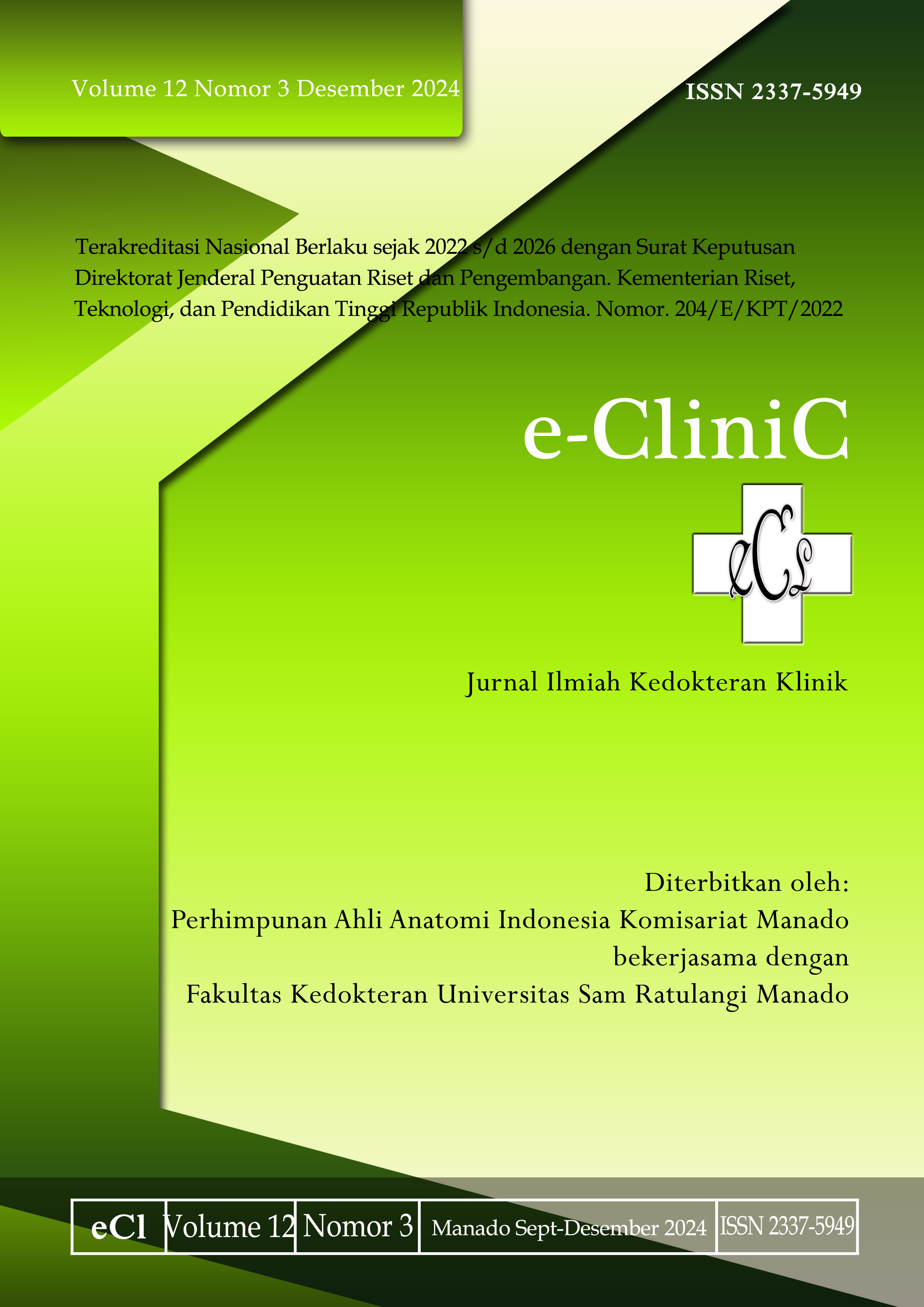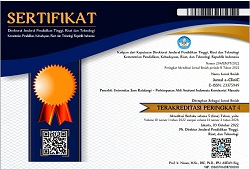Hubungan antara Pendekatan Belajar dengan Prestasi Akademik Mahasiswa Program Studi Pendidikan Dokter Fakultas Kedokteran Universitas Sam Ratulangi Angkatan 2020
DOI:
https://doi.org/10.35790/ecl.v12i3.53707Abstract
Abstract: One of the influencing factors on academic achievement is the learning approach, which is a combination of motivation and strategies that an individual uses to improve his/her knowledge. Learning approach is classified into surface and deep learning approaches. This study aimed to determine the relationship between learning approach and academic achievement of students in the Medical Education Study Program of class of 2020, Faculty of Medicine, Universitas Sam Ratulangi. This was an observational and analytical study with a cross-sectional design. Samples were obtained by using total sampling with inclusion and exclusion criteria. Learning approach data were obtained by using the Revised Study Process Questionnaire 2 Factors (R-SPQ-2F). Data were analyzed using the Fisher Exact test. The results obtained 162 students as samples, dominated by 124 (76.5%) students with deep learning approach, while 38 (23.5%) students used surface learning approach. Furthermore, the majority of students obtained Cumulative Grade Point Average (CGPA) with honors/cum laude (>3.50) amounting to 89 (54.9%) students. The Fisher Exact test, obtained a p-value of 0.936 (p>0.05). In conclusion, there is no relationship between the learning approach and the academic achievement of students in the Medical Education Study Program of class of 2020, Faculty of Medicine, Universitas Sam Ratulangi.
Keywords: learning approach; academic achievement; medical students
Abstrak: Salah satu faktor yang memengaruhi prestasi akademik ialah pendekatan belajar (learning approach), yang merupakan gabungan antara motivasi dan strategi yang digunakan seseorang saat mencari pengetahuan. Pendekatan belajar diklasifikasikan menjadi pendekatan belajar permukaan (surface) dan dalam (deep). Penelitian ini bertujuan untuk mengetahui hubungan antara pendekatan belajar dengan prestasi akademik mahasiswa Program Studi Pendidikan Dokter Fakultas Kedokteran Universitas Sam Ratulangi Angkatan 2020. Jenis penelitian ini ialah analitik observasional dengan desain potong lintang. Teknik sampling yang digunakan ialah total sampling dengan kriteria inklusi dan eksklusi. Data pendekatan belajar diperoleh menggunakan the Revised Study Process Questionnaire 2 Factors (R-SPQ-2F). Uji statistik dalam penelitian ini ialah uji Fisher Exact. Hasil penelitian mendapatkan total sampel penelitian berjumlah 162 mahasiswa yang didominasi oleh 124 (76,5%) mahasiswa dengan pendekatan belajar dalam (deep), sedangkan 38 (23,5%) mahasiswa menggunakan pendekatan belajar permukaan (surface). Mayoritas mahasiswa memperoleh Indeks Prestasi Kumulatif (IPK) dengan predikat pujian/cum laude (>3,50) berjumlah 89 (54,9%) mahasiswa. Hasil uji Fisher Exact mendapatkan nilai p=0,936 (p>0,05). Simpulan penelitian ini ialah tidak terdapat hubungan antara pendekatan belajar dengan prestasi akademik mahasiswa Program Studi Pendidikan Dokter Fakultas Kedokteran Universitas Sam Ratulangi Angkatan 2020.
Kata kunci: pendekatan belajar, prestasi akademik, mahasiswa kedokteran
References
Zhang LF, Sternberg RJ. Are learning approaches and thinking styles related? A study in two chinese populations. Journal of Psychology: Interdisciplinary and Applied. 2000;134(5):469–89. Doi: https://doi.org/10.1080/00223980009598230
Lastri L, Kartikowati S, Sumarno. Analysis of factors that influence student learning achievement. Journal of Educational Sciences. 2020;4(3):679-93. Doi: https://doi.org/10.31258/jes.4.3.p.679-693
Peraturan Rektor Universitas Sam Ratulangi Nomor 01 Tahun 2019 Tentang Pedoman Penyelenggaraan Akademik di Universitas Sam Ratulangi. Available from: https://fk.unsrat.ac.id/wp-content/uploads/ Peraturan-Rektor-Nomor-1_Tahun_-2019.pdf
Peraturan Menteri Pendidikan dan Kebudayaan Republik Indonesia Nomor 03 Tahun 2020 Tentang Standar Nasional Pendidikan Tinggi. Available from: https://jdih.kemdikbud.go.id/detail_peraturan?main=2146
Rekap IPK lulusan. Dashboard.unsrat.ac.id. 2023. Available from: https://dashboard.unsrat.ac.id/Akademik/ rekapMasaStudiIPKProdi/72
Novaldy R, Oktaria D, Warganegara E. Hubungan antara learning approach dengan indeks prestasi kumulatif (IPK) mahasiswa Fakultas Kedokteran Universitas Lampung. Available from: http://repository.lppm. unila.ac.id/14733/
Chonkar SP, Ha TC, Chu SSH, Ng AX, Lim MLS, Ee TX, et al. The predominant learning approaches of medical students. BMC Med Educ. 2018. Doi: https://doi.org/10.1186/s12909-018-1122-5
Puteh MS, Latif NEA, Mansor N, Hamid Y, Halid S, Ghazali Z. Learning approaches and academic performance. Journal of Social Sciences Research. 2018;6:746–52. Doi: https://doi.org/10.32861/jssr.spi6.746.752
Donnison S, Penn-Edwards S. Focusing on first year assessment: Surface or deep approaches to learning? The International Journal of the First Year in Higher Education. 2012;3(2):9-20. Doi: 10.5204/intjfyhe.v3i2.127
Biggs JB. Approaches to the enhancement of tertiary teaching. Higher Education Research & Development. 1989;8(1):7–25. Doi: https://doi.org/10.1080/0729436890080102
Subasinghe LP, Wanniachchi DN. Approach to learning and the academic performance of a group of medical students-any correlation? 2012. Available from: https://www.semanticscholar.org/paper/Approach-to-learning-and-the-academic-performance-a-Subasinghe-Wanniachchi/bfaf102cd3fd7c4ce76866857716c77 e9f0ff5bd
Arini A, Malik R. Hubungan pendekatan belajar dengan prestasi belajar pada mahasiswa Fakultas Kedokteran Universitas Tarumanagara angkatan 2014. Tarumanagara Medical Journal. 2019;1(2):254-258. Doi: https://doi.org/10.24912/tmj.v1i2.3824
Rabbiyanti DK, Malik R. Hubungan pendekatan belajar dengan prestasi belajar pada mahasiswa Fakultas Kedokteran Universitas Tarumanegara Angkatan 2020. Ebers Papyrus. 2023;29(1):22-30. Doi: https://doi.org/10.24912/ep.v29i1.24571
Neang FRD, Artawan IM, Woda RR, Rini DI. The correlation between learning approach and learning achievement among medical education students. Jurnal Psikologi Pendidikan & Konseling. 2022;8(1):16–22. Doi: https://doi.org/10.26858/jpkk.v8i1.38136
Barros R, Monteiro A, Nejmedinne F, Moreira JA. The relationship between students’ approach to learning and lifelong learning. Psychology. 2013;4(11):792–7. Doi: http://dx.doi.org/10.4236/psych.2013.411113
Wijayanto R, Harsono, Kumara A. Hubungan antara persepsi situasi pembelajaran dengan pendekatan belajar mahasiswa Blok Muskuloskeletal di Fakultas Kedokteran Universitas Pelita Harapan. Jurnal Pendidikan Kedokteran Indonesia. 2012;1(3):212-22. Available from: https://journal.ugm.ac.id/jpki/article/view/ 25107/16125
Biggs J, Kember D, Leung DYP. The revised two-factor Study Process Questionnaire: R-SPQ-2F. British Journal of Educational Psychology. 2001;71(1):133–49. Doi: https://doi.org/10.1348/000709901158433
Hasnor HN, Ahmad Z, Nordin N. The Relationship between Learning Approaches and Academic Achievement Among Intec Students, Uitm Shah Alam. Procedia Social and Behavioral Sciences. 2013:178–86. Doi: https://doi.org/10.1016/j.sbspro.2013.07.080
Qureshi SS, Larson AH, Vishnumolakala VR. Factors Inuencing Medical Students’ Learning Approach in Qatar. 2021. Doi: https://doi.org/10.21203/rs.3.rs-916481/v1
Ali SS. Problem Based learning: a student-centered approach. English Language Teaching. 2019;12(5):73-78. Available from: https://eric.ed.gov/?id=EJ1212283
Standar Pendidikan Profesi Dokter Indonesia. Jakarta: Konsil Kedokteran Indonesia; 2012. Available from: https://kki.go.id/uploads/media/1683690143_2a5b407e030985fb727b.pdf
Dent JA, Harden RM, Hunt D. A Practical Guide for Medical Teachers (5th ed). Elsevier; 2017. Available from: https://www.kmc.edu.pk/new/wp-content/uploads/2020/09/A-Practical-Guide-for-Medical-Teachers-5e.pdf
Entwistle N. Approaches to learning and forms of understanding. 1998. Available from: https://www. researchgate.net/publication/5-20._Approaches_to_learning_and_forms_of_understanding
Ishayati. Identifikasi masalah belajar dan faktor penyebab kesulitan belajar pada siswa Sekolah Dasar. Jurnal Ilmiah Guru COPE. 2007;XI(1):5-20. Available from: https://journal.uny.ac.id/index.php/cope/article/ download/5449/4744
Lozano-Blasco R, Quílez-Robres A, Usán P, Salavera C, Casanovas-López R. Types of intelligence and academic performance: a systematic review and meta-analysis. Journal of Intelligence. 2022;10(4):123. Doi: https://doi.org/10.3390%2Fjintelligence10040123
Lee J, Shute VJ. Personal and social-contextual factors in K-12 academic performance: an integrative perspective on student learning. Educational Psychologist. 2010;45(3):185–202. Doi: https://doi.org/ 10.1080/00461520.2010.493471
Panduan Akademik Program Studi Pendidikan Dokter Fakultas Kedokteran Universitas Sam Ratulangi. 2019. Available from: https://drive.google.com/file/d/10lgwzIKElEej7qgIWj-9geiRZaS7yXg5/view
Downloads
Published
How to Cite
Issue
Section
License
Copyright (c) 2024 Angellita M. Irene, Elvin C. Angmalisang, Herlina I. S. Wungouw

This work is licensed under a Creative Commons Attribution-NonCommercial 4.0 International License.
COPYRIGHT
Authors who publish with this journal agree to the following terms:
Authors hold their copyright and grant this journal the privilege of first publication, with the work simultaneously licensed under a Creative Commons Attribution License that permits others to impart the work with an acknowledgment of the work's origin and initial publication by this journal.
Authors can enter into separate or additional contractual arrangements for the non-exclusive distribution of the journal's published version of the work (for example, post it to an institutional repository or publish it in a book), with an acknowledgment of its underlying publication in this journal.
Authors are permitted and encouraged to post their work online (for example, in institutional repositories or on their website) as it can lead to productive exchanges, as well as earlier and greater citation of the published work (See The Effect of Open Access).







